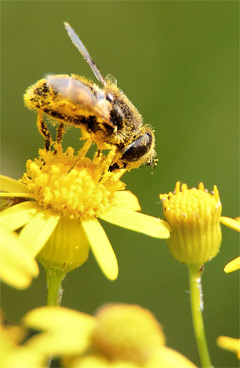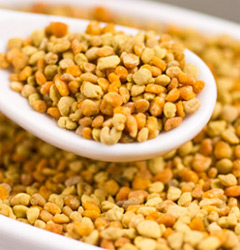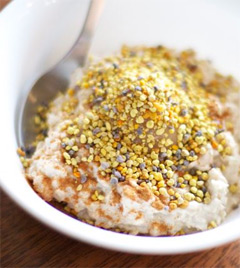|
|
Bee Pollen: A Miraculous Super Food
 Bee
Pollen is made by honeybees, and is the food of the young bee. It is considered
one of nature's most completely nourishing foods as it contains nearly all
nutrients required by humans. Bee-gathered pollens are rich in proteins
(approximately 40% protein), free amino acids, vitamins, including B-complex,
and folic acid. Bee
Pollen is made by honeybees, and is the food of the young bee. It is considered
one of nature's most completely nourishing foods as it contains nearly all
nutrients required by humans. Bee-gathered pollens are rich in proteins
(approximately 40% protein), free amino acids, vitamins, including B-complex,
and folic acid.
Bee pollen is a complete food and contains many elements that products of animal
origin do not possess. Bee pollen is more rich in proteins than any animal
source. It contains more amino acids than beef, eggs, or cheese of equal weight.
About half of its protein is in the form of free amino acids that are ready to
be used directly by the body.
It is important to recognize that a one teaspoon dose of pollen takes one bee
working eight hours a day for one month to gather. Each bee pollen pellet,
contains over two million flower pollen grains and one teaspoonful contains over
2.5 billion grains of flower pollen.
Health benefits of Bee pollen.
1. Energy Enhancer - The range of nutrients found within bee pollen makes
it a great natural energizer. The carbohydrates, protein and B vitamins can help
keep you going all day by enhancing stamina and fighting off fatigue.
2. Skin Soother - Bee pollen is often used in topical products that aim
to treat inflammatory conditions and common skin irritations like psoriasis or
eczema. The amino acids and vitamins protect the skin and aid the regeneration
of cells.
3. Respiratory System - Bee pollen contains a high quantity of antioxidants that
may have an anti-inflammatory effect on the tissues of the lungs, preventing the
onset of asthma.
4. Treating Allergies � Pollen reduces the presence of histamine, ameliorating
many allergies. Dr. Leo Conway, M.D of Denver Colorado, reported that 94 per
cent of his patients were completely free from allergy symptoms once treated
with oral feeding of pollen. Everything from asthma to allergies to sinus
problems were cleared, confirming that bee pollen is wonderfully effective
against a wide range of respiratory diseases.
5. Digestive System - In addition to healthful vitamins, minerals and protein,
bee pollen contains enzymes that can aid in digestion. Enzymes assist your body
in getting all the nutrients you need from the food that you eat.
6. Immune System Booster - Pollen is good for the intestinal flora and thereby
supports the immune system. According to holistic health expert Dr. Joseph Mercola,
bee pollen has antibiotic-type properties that can help protect the body from
contracting viruses. It's also rich in antioxidants that protect the cells from
the damaging oxidation of free radicals.
7. Treats Addictions � Used holistically for healing addictions and inhibiting
cravings by suppressing impulses. Because bee pollen crashes cravings, it is a
very useful research is needed into this benefit, particularly when it comes to
weight management.
8. Supports the Cardiovascular System - Bee Pollen contains large amounts of Rutin; an antioxidant bioflavonoid that helps strengthen capillaries, blood
vessels, assists with circulatory problems and corrects cholesterol levels. Its
potent anti-clotting powers could help prevent heart attack and stroke.
9. Prostate Aid - Men who suffer from benign prostate hyperplasia can find
relief by using bee pollen. Bee pollen can help reduce inflammation to stop
frequent urges to urinate.
10. Infertility Problems - Bee pollen stimulates and restores ovarian function,
therefore may be used to assist in accelerating pregnancy. As well as being a
hormonal booster it is also a great aphrodisiac!
Bee pollen is said to be a super food, nature�s miracle for everything from
lacklustre energy to lowering cholesterol to slowing aging and preventing colds
and flu. It�s chemical compound includes vitamins A, B,C, D, E, K, folic acid,
calcium, potassium, iron, zinc, magnesium, selenium, protein and amino acids to
name a few. No wonder people swarm to it.
It�s sort of the equivalent of taking a mega vitamin tincture. �It�s not like an
aspirin for your blood pressure, it�s like a food. How many apples would you
like to eat today � says Dale Grindley, LAc, DIHOM, a homeopath at Harmony
Healing Arts, a family homeopathy & acupuncture centre in Toronto.
Grindley says you can�t really quantify exactly what it does for you, what does
food do for you �People who take it feel better.�
Allergies: The buzzkill "You must know your bee status before consuming bee
pollen,� cautions Grindley. Are you allergic to bees Have you ever been stung
Do you have pollen
allergies �I saw a lady the other day take a mouthful of bee pollen and almost
went into anaphylactic shock.�
 If you know or suspect you have pollen allergies, suffer from hay fever or are
allergic to bees, check with your doctor before ingesting any potential
allergen. If you know or suspect you have pollen allergies, suffer from hay fever or are
allergic to bees, check with your doctor before ingesting any potential
allergen.
If you don�t have any allergies, you can test your bee status by placing one or
two grains of pollen on your tongue and waiting a few minutes. If nothing
happens, chew them up.
Wait again. Your body will let you know if it has the slightest allergy to
pollen by producing watery eyes, sneezing, swelling of the mouth, lips or
tongue. If no reaction, wait 24 hours before you consumer a larger amount of bee
pollen.
Most experts say to skip pollen if you�re pregnant or breast feeding, and if you
take blood thinners.
Can bee pollen kick seasonal allergies to the curb It�s possible. Some people
claim taking small amounts of pollen expose your body to the allergen and
desensitize your allergies over time. The problem is most people will have an
allergy flare up taking local honey or bee pollen.
�Bee pollen literally is what you breathe in when you have seasonal allergies,�
says Cheryl Loraditch, owner and beekeeper of Bear Foot Honey Farm in Sonoma
County, Calif.
�About one percent of the people cannot handle bee pollen even in low doses due
to how their body reacts to it,� says Loraditch.
To improve pollen allergies Grindley says to take the smallest daily dose
possible that doesn�t give you an allergic reaction, and see if you can increase
it in time. Again, check with your doctor about trying this beforehand.
Where to get bee pollen The best place to purchase pollen is from a local
beekeeper you trust. Make sure the pollen you get is free from mould,
pesticides, agrochemicals and that bee colonies are not chemically treated. Bee
pollen can be found in some grocery stores, health food stores and farmers�
markets. A lot of commercial pollen comes from other countries, so talk to your
seller about where it comes from.
Many beekeepers don�t collect pollen because it�s finicky. It molds quickly and
needs to be collected every few days, and either sold fresh, frozen or
dehydrated. And over-heating is not good either. Bee pollen should never taste
toasted, baked or burnt, as that destroys its healthful properties.
Color and taste The colour of bee pollen is no indication of quality. It is most
frequently a bright yellow, but red, purple, green, brown, orange and other
colours are common.
Grindley explains that bees get tree pollen before flowers bloom, which is
typically beige or brown. Then in summer pollen becomes bright yellow and orange
because of the flowers bees feast on. Towards fall pollen is golden from fall
foliage.
Bee pollen has a sweet powdery, floral taste. The best place to store it is in
the refrigerator or freezer. Sunlight and heat will destroy the nutrient value.
Pollen stored in a cool dark place should keep for a year.
The bees knees on taking bee pollen After you�ve determined your bee status,
take one to three tablespoons of bee pollen daily. Try it in smoothies and
shakes, sprinkle on yogurt or applesauce, ground into homemade granola or
sprinkle on salads.
How is bee pollen different from royal jelly Royal jelly is produced by the
body of the bees. It�s like sticky milk that�s excreted from certain age bees
and is used to feed the colony, the newly hatched larvae for the first three
days, and to feed the queen for her entire life.
�Extracting it is very stressful on the bees; gathering royal jelly is not a
natural process,� says Grindley. �You put the bee hive into a very unnatural
cycle of life, so it�s not particularly pleasant for the bees, because they are
putting out all this royal jelly trying to feed their children, and you�re just
constantly stealing it.� Grindley says it can be done ethically for a short time
and then the hive is returned to a normal life cycle and another hive is used.
Royal jelly is said to be even better than bee pollen as a super food. �Royal
jelly is made from bee pollen but it is humane to harvest pollen and (in our
opinion) inhumane to harvest royal jelly,� says Loraditch.
Researchers have demonstrated that there is a substance in bee pollen that
inhibits the development of numerous harmful bacteria. Experiments have shown
bee pollen contains an antibiotic factor effective against salmonella and some
strains of bacteria. On the clinical level, studies have shown that a regulatory
effect on intestinal function can be attributed to bee pollen. The presence of a
high proportion of cellulose and fibre in pollen, as well as the existence of
antibiotic factors, all contribute to an explanation for this efficacious
effect.
Working with lab animals has demonstrated that the ingestion of bee pollen has a
good effect on the composition of blood. A considerable and simultaneous
increase of both white and red blood cells is observed. When bee pollen is given
to anaemic patients, their levels of haemoglobin [oxygen-carrying red blood
cells] increase considerably.
 It is reported that bee pollen in the diet acts to normalize cholesterol and
triglyceride levels in the blood: Upon the regular ingestion of bee pollen, a
reduction of cholesterol and triglycerides was observed. High-density
lipoproteins (HDL) increased, while low-density lipoproteins (LDL) decreased. A
normalization of blood serum cholesterol levels is also seen. It is reported that bee pollen in the diet acts to normalize cholesterol and
triglyceride levels in the blood: Upon the regular ingestion of bee pollen, a
reduction of cholesterol and triglycerides was observed. High-density
lipoproteins (HDL) increased, while low-density lipoproteins (LDL) decreased. A
normalization of blood serum cholesterol levels is also seen.
One of the most important articles ever published on bee pollen comes from our
own United States Department of Agriculture. This article, entitled "Delay in
the Appearance of Palpable Mammary Tumours in C3H Mice Following the Ingestion
of Pollinized Food," is the work of William Robinson of the Bureau of
Entomology, Agriculture Research Administration. It was published in the Journal
of the National Cancer Institute way back in October 1948, five decades ago.
According to the article, Dr. Robinson started with mice that had been specially
bred to develop and subsequently die from tumours. He explains, "The age at
which mice of this strain developed tumours ranged from 18 to 57 weeks, with an
average appearance at 33 weeks. Tumour incidence was 100 per cent."
The pollen used in this study was supplied by the Division of Bee Culture and,
according to the report, "was the bee-gathered type." One group of mice was fed
mice chow only; another group was fed mice chow with the addition of bee pollen
at a ratio of 1 part bee pollen to 10,000 parts food. Dr. Robinson's article
states, "Particular attention was given to the weight of the treated animals,
since underweight can in itself bring about a delay in tumour development. No
decrease in weight occurred in the animals receiving the pollinized food.
Instead, a slight but fairly uniform increase was noted, possibly due to a
nutritional factor in pollen."
In his summary, Dr. Robinson reveals the dramatic results: "In the untreated
mice [the mice not given bee pollen], mammary tumours appeared as expected at an
average of 31.3 weeks. Tumour incidence was 100 per cent. In the postponement
series, [the mice given bee pollen], the average [onset of tumours] was 41.1
weeks, a delay of 9.8 weeks being obtained. Seven mice in this series were still
tumour-free at 56 to 62 weeks of age, when the tests were terminated. I would
like to emphasize that these mice were especially bred to die from cancerous
tumours. Without the protection of bee pollen in their food, the mice developed
tumours and died right on schedule.
Given the fact that cancer is the number-two killer in the United States (heart
disease is number one), we can all certainly agree that this is an electrifying
article. What happened from it Nothing. Even the National Cancer Institute,
which published it, failed to follow up on this very promising line of research.
It was dropped with no explanation.
More good news comes from the University of Vienna, where Dr. Peter Hernuss and
colleagues conducted a study of twenty-five women suffering from inoperable
uterine cancer. Because surgery was impossible, the women were treated with
chemotherapy. The lucky women given bee pollen with their food quickly exhibited
a higher concentration of cancer-fighting immune-system cells, increased
antibody production, and a markedly improved level of infection-fighting and
oxygen carrying red blood cells (hemoglobin). These women suffered less from the
awful side effects of chemotherapy as well. Bee pollen lessened the terrible
nausea that commonly accompanies the treatment and helped keep hair loss to a
minimum. The women also slept better at night. The control group receiving a
placebo did not experience comparable relief.
A report from the Agronomic Institute, Faculty of Zootechnics, Romania, showed
the immune-strengthening effects of bee pollen. According to the report,
"Comparative Studies Concerning Biochemical Characteristics of Beebread as
Related to the Pollen Preserved in Honey" by Drs. E. Palos, Z. Voiculescu, and
C. Andrei, "An increase has been recorded in the level of blood lymphocytes,
gamma globulins, and proteins in those subjects given pollen in comparison with
control groups. The most significant difference occurred in lymphocytes. These
results thus signify a strengthening in the resistance of the organic system."
Lymphocytes are the white blood cells that are the "soldiers" of the immune
system. They are responsible for ridding the body of injurious and harmful
substances, including infected or diseased cells, mutant and cancerous cells,
viruses, metabolic trash, and so on. Gamma globulin is a protein formed in the
blood, and our ability to resist infection is closely related to this protein's
activity.
Bee pollen appears to be safe, at least when taken for a short term. But if you
have pollen allergies, you may get more than you bargained for. Bee pollen can
cause a serious allergic reaction -- including shortness of breath, hives,
swelling, and anaphylaxis. Bee pollen is not safe for pregnant women. A woman
should also avoid using bee pollen if she is breastfeeding. Bee pollen may cause
increased bleeding if taken with certain blood thinners like warfarin. Check
with your doctor before taking bee pollen if you take any medications,
over-the-counter medicines, or herbals.
Dated 05 August 2013
|
|
|
|
|









